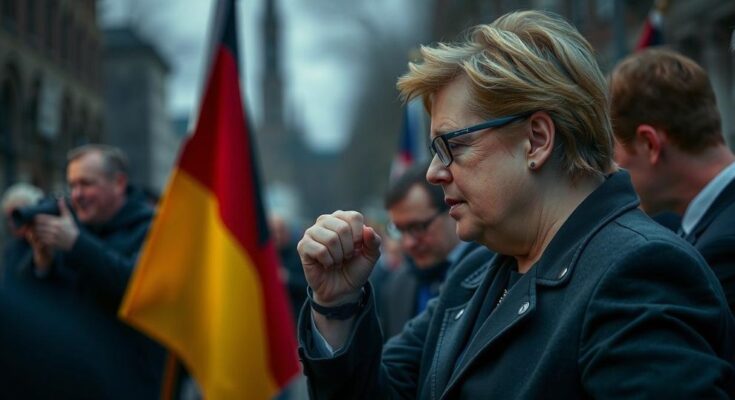Chancellor Olaf Scholz faces growing calls to step aside as the SPD candidate for Germany’s February election. His defense minister, Boris Pistorius, is more popular, prompting crisis talks within the party. With polls showing the CDU significantly ahead, prominent SPD members advocate for a leadership change, reflecting dissatisfaction with Scholz’s performance amid economic challenges and rising anti-incumbent sentiments.
Chancellor Olaf Scholz of Germany is facing intensified pressure to withdraw as the candidate of his party for the upcoming snap election scheduled for February. This pressure stems from his defense minister, Boris Pistorius, who has emerged as the most favored politician in the country. Reports indicate that crisis talks among the Social Democratic Party (SPD) leadership will take place while Scholz returns from the G20 summit in Brazil, igniting speculation about a potential leadership change with only 100 days remaining in the campaign. Scholz, having navigated a fractured coalition since 2021, had hoped for re-election; however, his political standing has dwindled as evidenced by recent polls placing him at the bottom among leading politicians. Despite Scholz’s attempts to stabilize his party amidst internal conflicts and economic challenges, the SPD has garnered significantly less support than its main rival, the Christian Democratic Union (CDU). Prominent SPD members are increasingly vocal about the need for a change, citing discontent with Scholz’s leadership. With the CDU polling at 32% compared to the SPD’s 16%, former party leader Sigmar Gabriel has urged the SPD to adopt a bolder approach or risk falling further behind. Furthermore, the recent surge of alternative political factions, such as the far-right Alternative für Deutschland (AfD), has added to the urgency of the situation. Critics have pointed to Scholz’s detached and complacent demeanor as factors contributing to his party’s struggles. His political approach has also been scrutinized, especially concerning the ongoing ramifications of Ukraine’s crisis. Although some analysts believe that Scholz might still leverage his role in aiding Ukraine to maintain his position, his defense minister, Pistorius, has been gaining traction as a suitable successor, appealing to voters with his affability and decisiveness. Meanwhile, Pistorius has had to navigate his ambition to maintain loyalty to Scholz while expressing openness to future opportunities in the political landscape.
The political atmosphere in Germany is currently charged as Chancellor Olaf Scholz grapples with declining public support ahead of a consequential election. His defense minister, Boris Pistorius, who enjoys higher popularity, is seen by many as a worthy alternative candidate. With the looming February 2024 election, the SPD must evaluate its internal dynamics and voter sentiment amid a broader context of economic distress and rising political competition from opposition parties.
As Germany approaches an impending election, Chancellor Scholz is under significant scrutiny regarding his leadership as internal party dissatisfaction mounts. The emergence of Boris Pistorius as a favored alternative raises critical questions about the SPD’s viability against the CDU. Scholz must navigate a precarious political landscape characterized by public discontentment and competing factions within his ranks, making the decision to remain the candidate increasingly precarious.
Original Source: www.theguardian.com




